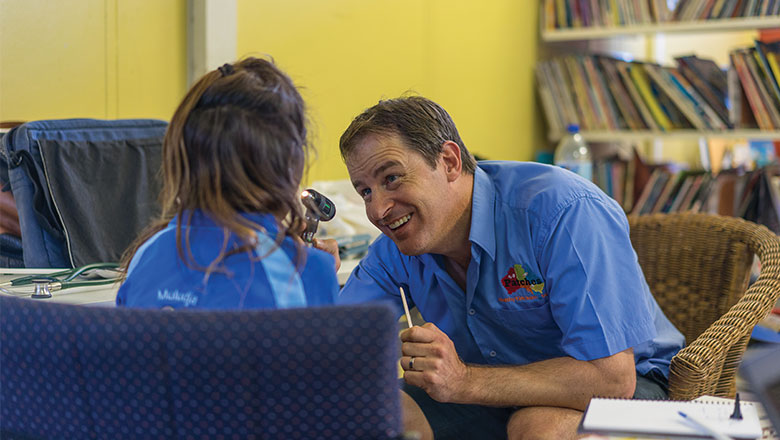Search
Showing results for "mental health aboriginal"

News & Events
Making FASD history in the Fitzroy ValleyThe Make FASD History campaign, led by community researchers and The Kids Research Institute Australia, has made huge inroads into prevention, diagnosis and therapy.
Research
Novel method to select meaningful outcomes for evaluation in clinical trialsA standardised framework for selecting outcomes for evaluation in trials has been proposed by the Core Outcome Measures in Effectiveness Trials working group. However, this method does not specify how to ensure that the outcomes that are selected are causally related to the disease and the health intervention being studied. Causal network diagrams may help researchers identify outcomes that are both clinically meaningful and likely to be causally dependent on the intervention, and endpoints that are, in turn, causally dependent on those outcomes.
News & Events
National Grants for Innovative Child Health ResearchPerth's Telethon Institute for Child Health Research has been awarded more than 3 million dollars from the National Health and Medical Research Council (NHMRC)
Research
Safety and immunogenicity of pneumococcal conjugate vaccines in a high-risk population: a randomised controlled trial of PCV in Papua New Guinean infantsInfant vaccination with 3 doses of PCV10 or PCV13 is safe and immunogenic in a highly endemic setting
On this Research Impact page, we showcase real game-changers - research that changes the very way other scientists around the world think and approach challenges. The far-reaching impact on children and families for all the stories shown on these pages is both exciting and significant.

News & Events
Stan Perron Charitable Foundation grants boost WA child health researchNew funding from the Stan Perron Charitable Foundation will support innovative research projects and programs at The Kids Research Institute Australia with the aim of improving the health and wellbeing of WA children and their families.
Research
BEAT CF pulmonary exacerbations core protocol for evaluating the management of pulmonary exacerbations in people with cystic fibrosisCystic fibrosis (CF) is a rare, inherited, life-limiting condition predominantly affecting the lungs, for which there is no cure. The disease is characterized by recurrent pulmonary exacerbations (PEx), which are thought to drive progressive lung damage. Management of these episodes is complex and generally involves multiple interventions targeting different aspects of disease. The emergence of innovative trials and use of Bayesian statistical methods has created renewed opportunities for studying heterogeneous populations in rare diseases.
Research
How Well Does the EQ-5D-Y-5L Describe Children With Intellectual Disability?: “There's a Lot More to My Child Than That She Can't Wash or Dress Herself.”The EQ-5D-5L is a generic health utility instrument for measuring health-related quality of life (HRQoL), with self-report and proxy report versions for children (EQ-5D-Y-5L). Children with intellectual disability (ID) are a heterogeneous population whose impairments and comorbidities place them at risk of poor HRQoL. This study aimed to describe the content validity and suitability for children with ID of a proxy report version of the EQ-5D-Y-5L as seen by their caregivers.
Research
Acceptability and Implementation Challenges of Benzathine Penicillin G Secondary Prophylaxis for Rheumatic Heart Disease in Ethiopia: A Qualitative StudyMonthly intramuscular injections of benzathine penicillin G (BPG) remain the cornerstone of secondary prophylaxis for acute rheumatic fever and rheumatic heart disease (RHD). The barriers to successful delivery of BPG may be patient- or service-delivery-dependent.
Research
Screen ORIGINSDesiree Silva MBBS, FRACP, MPH, PhD Co-Director, ORIGINS desiree.silva@thekids.org.au Co-Head, The ORIGINS Project Professor Desiree Silva is
